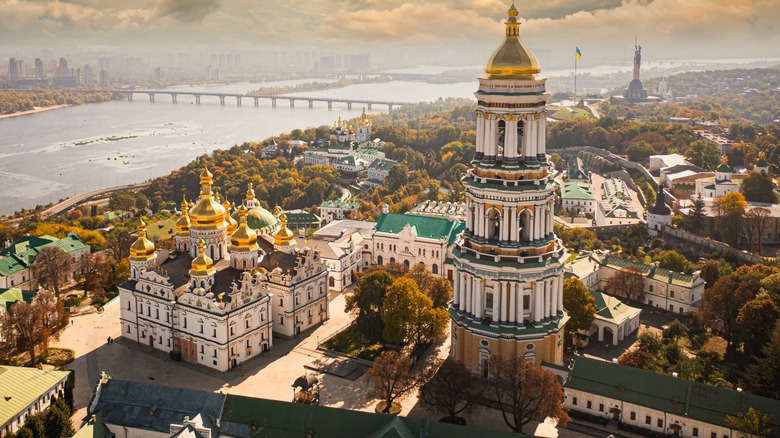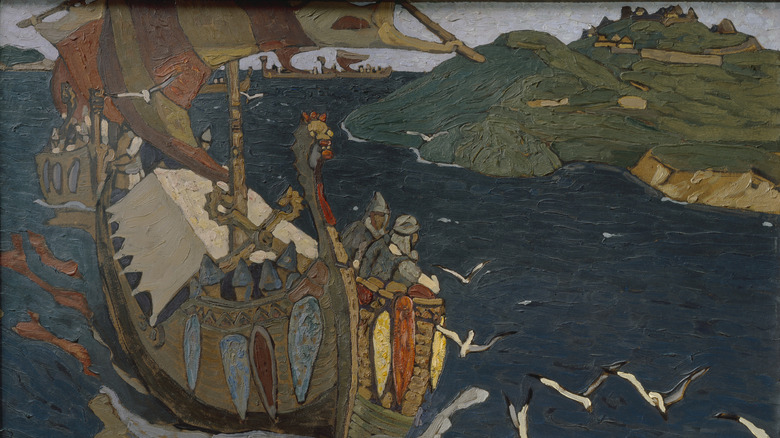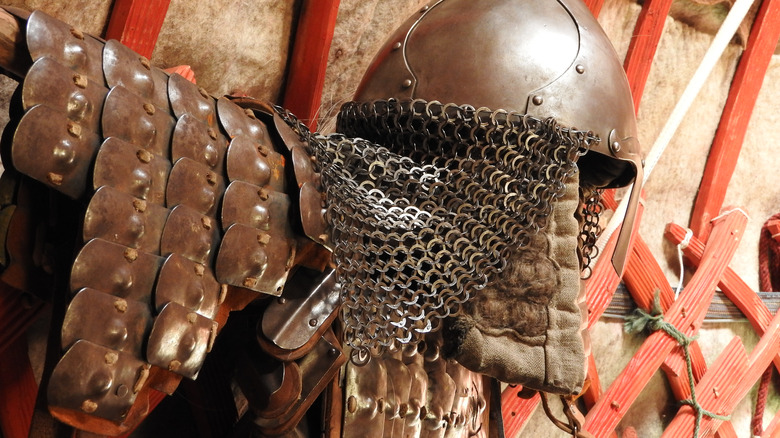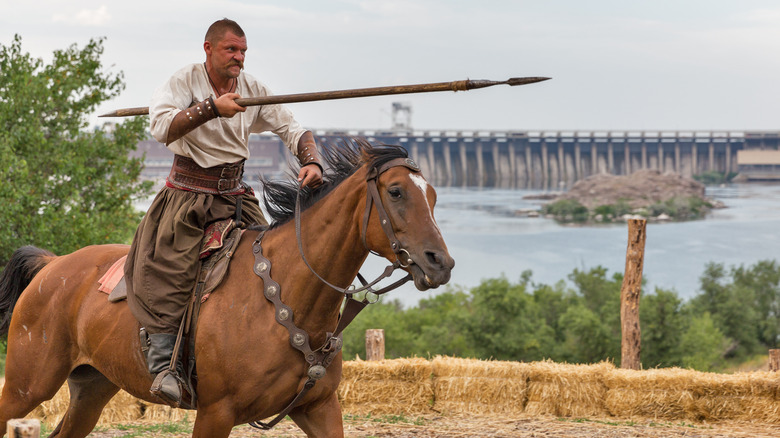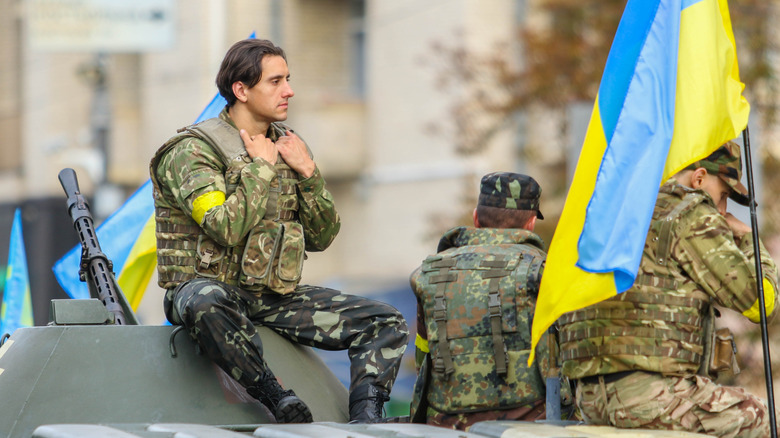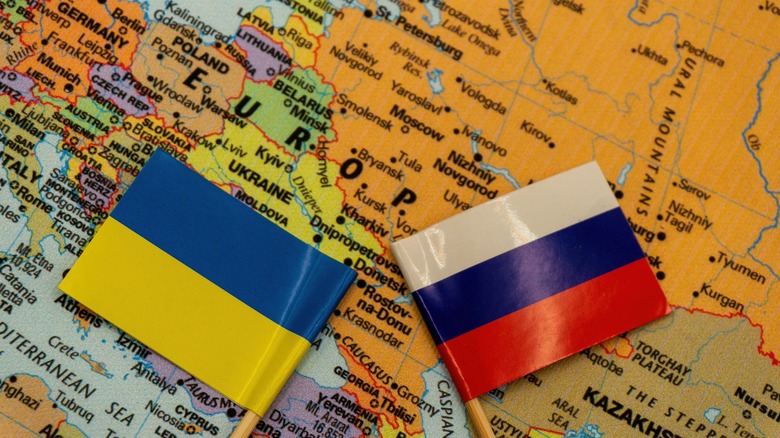The History Behind The Spelling Of Ukraine's Capital City Kyiv
Kyiv, the capital of Ukraine, is one of the jewels of Eastern Europe. Hugging the banks of the river Dnipro, Kyiv is home to about 3 million people (per Britannica), who live among some of the most magnificent public art works in the region, including the Orthodox cathedral complex of St. Sophia, the famous Maidan Square where the pro-European "Euromaidan" movement took its name, and a number of city gates dating back to the 900s.
Kyiv has an equally magnificent history. It has been continuously inhabited since the Paleolithic Era, according to Britannica, evidenced by mammoth bone artifacts. Transformed by Vikings into a proper city, Kyiv was the site of Eastern Europe's conversion to Christianity. It has been destroyed twice in its history, first by the Mongols in the 13th century and then by the Germans in 1943, who leveled 40% of the city and massacred 34,000 Jewish Kyivans. Both times, Kyiv recovered and expanded.
Kyiv (Київ) is sometimes referred to by its Russian name, Kiev (Киев). This usage has become increasingly controversial, as the Columbia Journalism Review notes. To understand why, we have to look at the history of this complex, storied city.
A city on three hills
For long stretches of its history, Ukraine has been under Russian control. This includes the Soviet period, which in Ukraine lasted from 1920 to 1991 (per Britannica), as well as the 2022 occupation.
The two countries share a complicated history. Ukraine, in fact, is older than Russia — or at least Kyiv is. Before the existence of either country, Eastern Europe was inhabited by tribes collectively called the Eastern Slavs, who spoke similar Indo-European languages and shared a more or less common culture. The Slavs did not have anything like a state and were constantly at war, both with each other and their neighbors: the Byzantine Empire in the south, Asian raiders on the Ukrainian steppe, Germans in the west, and eventually Muslims sent from Baghdad.
A 12th-century chronicle records that three Slavic brothers, Kyi, Shchek, and Khoryv, founded a city on three hills by the banks of the Dnipro and named Kyiv, for the oldest brother. Later, around the 800s, the Viking mercenaries in the pay of Constantinople captured Kyiv and made it the capital of a new state, called the Kyivan Rus. In 988, King Volodymyr ordered the mass baptism of his city in the river, converting the Rus to the Orthodox faith. Princeton University notes that in its heyday in the 11th century A.D., the Kyivan Rus was the largest sovereign country in Europe. Kyiv became a metropolis, not just Slavic and Germanic but with growing Greek, Jewish, Armenian, Genoese, and Arab populations.
The fall of Kyiv, the birth of Russia
Ukraine sits on the western end of a long, flat steppe that sprawls across Asia. On the opposite end, in the 1100s, warlord Genghis Khan was slaughtering his enemies and amassing an empire. By the 1200s, the Mongol Empire had reached Eastern Europe, and in 1240 a Mongol army, manned mostly by Tatar horsemen, sacked Kyiv. They killed so many people and burned so many buildings that six years later, a traveler found only 200 houses still standing (per Princeton University).
Most of the Kyivan Rus remained under the control of a Mongol army, called the Golden Horde. An independent rump state quickly organized itself in the north, around the cities of Novgorod and Moscow. This rump state could no longer call itself Kyivan Rus, as Kyiv had been lost. But they continued to use the name Rus, and became known as the Russians.
Kyiv took a long time to recover. In 1569 it went to the Polish-Lithuanian Commonwealth, Russia's Roman Catholic rival.
Russia absorbs Ukraine
Ukraine's steppe frontier was a kind of Wild West, with tribes of independent-minded horsemen who bristled at thought of anyone — Polish, Turkish, or Russian — impinging on their freedom. In 1649, one of these tribes, the Zaporizhian Cossacks, revolted, seizing Kyiv from the Polish army (per Britannica). But the Cossacks didn't have the money or the organizational skill to keep their independence, so in 1654 they signed a treaty with the Russians. The treaty put eastern Ukraine under Russian control, in exchange for a guarantee that the Cossacks could go on making and adjudicating their own laws.
The Polish-Lithuanian Commonwealth was already dwindling, so Russia had no problem absorbing Kyiv into its empire in 1686 and the rest of Ukraine by 1793. Ukraine would remain in the Russian Empire until the 1917 Revolution. Ukraine got its independence, but only technically; in 1918 the Russian Red Army was battling its enemies in Ukraine, and by 1920 Ukraine was admitted to the Soviet Union as the Ukrainian Soviet Socialist Republic.
Independence
In 1991, exhausted by its failing economy and reeling from a farcical coup attempt, the Soviet Union began to crumble. In December of that year, Ukraine held a referendum on whether the republic should declare its independence. According to the Helsinki Commission, 90% of voters said yes, a staggering majority.
However, the 800-year relationship between Russia and Ukraine has left substantial cultural links, especially in Ukraine's eastern provinces, where some people remain wary of the liberal, European sensibilities of their western compatriots, and feel ignored by the national government. (Kyiv, notably, is in the country's northwest.) According to data from the Kennan Institute, some 45% of Ukrainians still speak Russian as their first language. This substantial minority calls its capital Kiev, not Kyiv.
This has become a serious complication in Ukraine's foreign policy, especially in its relationship with Russia. In 2014, longtime Russian president Vladimir Putin occupied two of Ukraine's easternmost regions, Donetsk and Luhansk, as well as the Crimean peninsula. In 2022, he announced his plan to annex the entire country.
Denial of history
Shortly before sending in troops, Putin published an essay (posted on his government website) laying out his rationale. According to his thesis, the Russian, Ukrainian, and Belarusian peoples all constitute one historical nation, as the heirs of the Kyvan Rus. Foreign invasions (Mongol, Polish, Austrian) and nefarious actors at home (Nazis, nationalists, delinquents) carved away Ukraine from her natural home, creating a state cut off from its home nation. Ukrainian statehood, he wrote, was based on "hate and anger." Showing the influence of archreactionary philosophers like Aleksandr Dugin (via The Post), Putin seemed to call for a single, multiethnic, restored Russian Empire.
Historians from Rochester University, among many others, found his claims "dubious." The Ukrainian government agreed, reaffirming Ukraine's right to independence and its historical, cultural differences from the country that had dominated it for centuries.
How does the spelling of Kyiv figure in this? Using the Ukrainian spelling reaffirms Ukraine's right to exist as a sovereign nation. It is a gesture of solidarity; and as Russian bombs fell on Ukrainian maternity wards (per CNN) and 4 million refugees poured out of the country (per CNET), institutions all over the English-speaking world made a point to write Kyiv, and not Kiev.
